Who is here? 1 guest(s)
|
Psilidae?
|
|
| Tlerdahl |
Posted on 20-06-2017 17:50
|
|
Member Location: Posts: 141 Joined: 30.04.17 |
Photographed this tiny fly a few miles north of Bergen, Norway 05.06.2017. It sat on a building near of a forrest, with small lakes not far away. Is it possible to get an ID on this tiny fly? I think it looks like a Psilidae, but is it possible to find out what species this is? Best regards Truls Lerdahl |
|
|
|
| Paul Beuk |
Posted on 21-06-2017 08:38
|
|
Super Administrator Location: Posts: 19208 Joined: 11.05.04 |
Chamaepsila, could be limbatella
Paul - - - - Paul Beuk on https://diptera.info |
|
|
|
| Tlerdahl |
Posted on 21-06-2017 16:51
|
|
Member Location: Posts: 141 Joined: 30.04.17 |
Thanks a lot for the answer, Paul. I understand that this species are difficult, so it would be Chamaepsila I'm my archive. Best regards Truls |
|
|
|
| Paul Beuk |
Posted on 21-06-2017 20:05
|
|
Super Administrator Location: Posts: 19208 Joined: 11.05.04 |
Well, as far as I can tell there is only one pair of dorsocentrals. Considering the fact that the legs are pale yellow and the antennae are not entirely blackish should exclude the only other possibility for species with one pair of dc (gracilis).
Paul - - - - Paul Beuk on https://diptera.info |
|
|
|
| Tlerdahl |
Posted on 22-06-2017 15:32
|
|
Member Location: Posts: 141 Joined: 30.04.17 |
If I understand you right, Paul, you say this fly is Chamaepsila limbatella? Truls |
|
|
|
| Paul Beuk |
Posted on 22-06-2017 16:03
|
|
Super Administrator Location: Posts: 19208 Joined: 11.05.04 |
If I am right about the single pair of dc, yes. You may be able to see it even better in the Original image. 
Paul - - - - Paul Beuk on https://diptera.info |
|
|
|
| Tlerdahl |
Posted on 22-06-2017 16:19
|
|
Member Location: Posts: 141 Joined: 30.04.17 |
Yes it seems to be a single pair of dc, so thanks for the ID, Paul. Truls |
|
|
|
| Jocelyn Claude |
Posted on 29-09-2022 09:30
|
|
Member Location: Posts: 45 Joined: 29.08.22 |
Hello! There does indeed seem to be a particle of dc, only 2 vt and the mesonotum and abdomen black. So it is Chamaepsila buccata (Fallén, 1826) JOcelyn |
|
|
|
| Jump to Forum: |


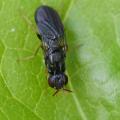



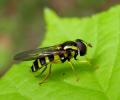
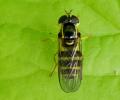

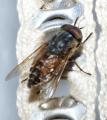
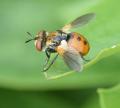



 but don't see the image in the post.
but don't see the image in the post.